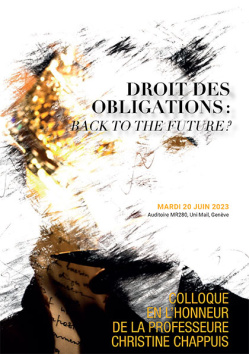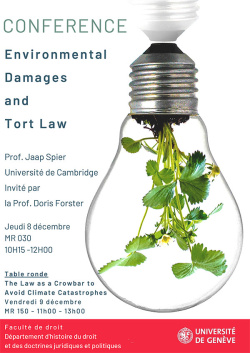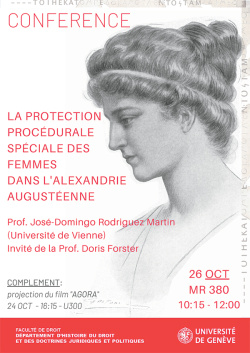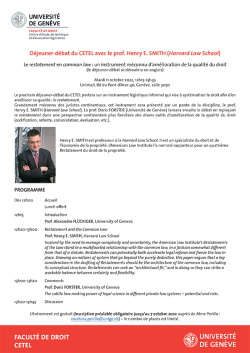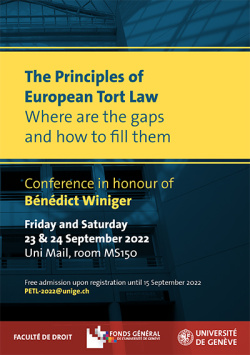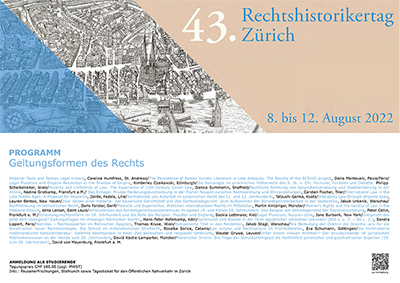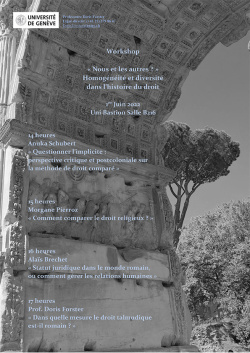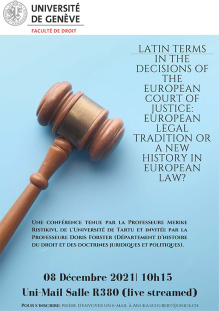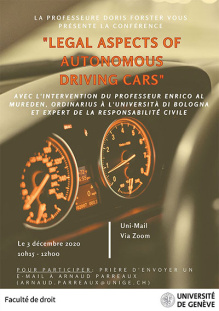Doris Forster
Notice biographique Enseignements Publications ContactsNotice biographique
Doris Forster a été nommée Professeure à la Faculté de droit de l’Université de Genève en 2020. Ses domaines de recherche sont notamment l’unification et la réception du droit, le pluralisme juridique de l’antiquité à nos jours ainsi que le droit religieux.
Après avoir effectué des études de droit à l’Albert-Ludwigs-Universität Freiburg, Warwick University (UK) (Certificate in English Law) et à l’Université de Constance (Erste Juristische Staatsprüfung), la Professeure Doris Forster a obtenu le grade de Docteure en droit (en 2015) à l’Université de Constance avec une thèse sur la lésion énorme en droit romain et talmudique (« Ona'ah und laesio enormis – Preisgrenzen im talmudischen und römischen Kaufrecht »). Sa thèse a par ailleurs été récompensée par le prix du 42. Deutscher Rechtshistorikertag. Au cours de sa thèse, elle a été membre du Exzellenzcluster « Kulturelle Grundlagen von Integration » de l’Université de Constance.
La Professeure Forster a par la suite effectué un post-doctorat dans la même Université et été chercheuse invitée à l’Université de Bologne. Elle a en outre séjourné dans divers instituts pour mener ses recherches (Université La Sapienza (Rome), Institut de droit romain (Université Paris II, Panthéon-Assas), Leopold-Wenger-Institut (LMU München)), ainsi que pour suivre un master d’approfondissement en droit romain et oriental (« Corso di alta Formazione in diritto romano », La Sapienza, Rome).
Après deux années de pratique notamment chez Siemens LLC (Dubai/Abu Dhabi, UAE) et auprès de l’étude d’avocats CMS Hasche Sigle, elle a passé le deuxième examen juridique d’État en 2015 (Zweite Juristische Staatsprüfung).
La Professeure Doris Forster est membre du Conseil participatif de la Faculté de droit et a été membre suppléante de la Commission de l’égalité de la même faculté (2021-2022). Elle a agi comme membre de l’Assemblée de l’Université de Genève (2021-2024), notamment en tant que Co-Présidente de la Commission de pilotage de la procédure de désignation de la rectrice ou du recteur de l’Université de Genève en 2023. Elle fait partie de la Commission de Fonds Spitzer (Université de Genève).
Sur le plan académique elle est membre de la Société Internationale Fernand de Visscher pour l’Histoire des Droits de l’Antiquité (SIHDA), du Forum für den Vergleich der Rechtsdiskurse der Religionen (Hochschule für Jüdische Studien Heidelberg) et de la Commission de direction du Centre d’études juridiques européennes (Centre d’excellence Jean Monnet) de l’Université de Genève.
Evènements
Nudging a human-centred design of the law in the automotive sector
le lundi 23 septembre 2024 à 16h à UniMail, salle 5389
Le Prof. Enrico al Mureden de l'Université de Bologne, expert renommé en droit des véhicules automatiques, interviendra sur les enjeux juridiques entourant cette technologie en plein essor.
Cette conférence fait partie d’une série de cours conjoints de l’Université de Bologne et de l’Université de Genève qui précède nos deux interventions lors du « Global Forum for Road Safety » à l'ONU cette semaine à Genève
et constitue une occasion d'approfondir les débats autour de la régulation des voitures automatiques.
Parution de l'ouvrage "Droit privé romain - Perspectives contemporaines"

Ce précis traite des fondements romains du droit privé moderne, tant en Suisse qu’en Europe. Enseigner la culture juridique romaine permet de mieux comprendre, à travers l’évolution de la pensée juridique, le droit actuel et les enjeux qui le sous-tendent. C’est également l’occasion de constater que le droit romain est toujours d’actualité dans l’élaboration de la législation.
Outre l’histoire du droit romain et de l’évolution de la pensée juridique en Europe, l’ouvrage aborde le droit des personnes et de la famille, les droits réels et le droit des obligations, à la fois dans leurs racines romaines et sous le prisme actuel.
- Une approche pédagogique, avec des questions récapitulatives et des cas pratiques pour chaque chapitre
- Dessins et photos de témoignages historiques
- L’accent mis sur les apports du droit romain dans le contexte actuel
- Une perspective comparative comprenant les droits suisse et allemand
The German law on autonomous driving between ethical dilemmas and new paradigms of responsibility
17 mai 2024, Bologna, via Zamboni 22, Palazzo Malvezzi Campeggi, aula 9 - Sala delle Armi
Progress around automated driving is attracting significant attention worldwide, in the domains of technology, politics, but also legal science. In 2021, Germany enacted the first law allowing level 4 automated driving outside of test phases. The law governs the technical requirements, the need for a technical supervisor, data handling, and the strict liability of the owner. Particularly noteworthy, as this is globally unique, is the fact that it regulates so-called ‘dilemma situations’ in the event of unavoidable accidents, for which it provides for mandatory human intervention by the technical supervisor. This talk analyzes the contents of the law, places it in the context of international law, and concludes by comparing it with other regulatory approaches in Switzerland and Shenzhen (China). The growing importance of product liability for intangible goods and for IA in general on the European scale is also part of the study.
Related publication : FORSTER, Doris. La nouvelle loi allemande sur les « voitures autonomes » : analyse comparative. In: Revue internationale de droit comparé, 2024, vol. 76, n° 1, p. 141–166.
Les animaux et le droit
Mardi 5 mars 2024, M3220, Uni Mail
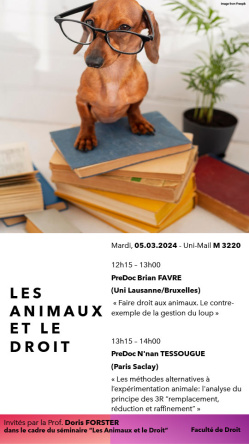
Droit des obligations: Back to the future ?
Colloque en l'honneur de la professeure Christine Chappuis
Mardi 20 juin 2023, Auditoire MR280, Uni Mail
Environmental Damages and Tort Law
Conférence du Prof. Jaap Spier, Université de Cambridge
Jeudi 8 décembre 2022 | MR030 - 10h15-12h00
Table ronde - The Law as a Crowbar to Avoid Climate Catastrophes
Vendredi 9 décembre 2022 | MR150 - 11h00 - 13h00
Can the law meaningfully contribute to come to grips with the global challenges, particularly climate change? How to strike a fair balance between the hugely diverging intra and inter-generational interests? How to keep the floodgates shut without compromising the most vulnerable countries and people and the environment?
La protection procédurale spéciale des femmes dans l'Alexandrie augustéenne
Conférence du Prof. Dr. Dr. José-Domingo Rodriguez Martin (Université de Vienne)
Les documents de mariage d'Alexandrie, rédigés sous la forme de συγχώρησις, prouvent qu'à l'époque augustéenne, une protection procédurale particulière était accordée à l'épouse par rapport à son mari. L'inclusion dans ces actes de clauses exécutoires d'origine ptolémaïque est très intéressante à la fois pour l'avantage procédural qu'elles offrent par rapport au mari et comme preuve de leur application effective à l'époque romaine. Ces clauses ont été maintenues pendant toute la période romaine, mais on peut se demander aujourd'hui si cette protection particulière a été conservée ou si elle a été remplacée par des systèmes spécifiquement romains.
Le restatement en common law : un instrument méconnu d’amélioration de la qualité du droit
Déjeuner-débat du CETEL avec le prof. Henry E. SMITH (Harvard Law School)
The Principles of European Tort Law - Where are the gaps and how to fill them
Conference in honour of Bénédict Winiger
43. Rechtshistorikertag, 8.-12.08.2022, Zurich, 'Geltungsformen des Rechts'
Workshop - « Nous et les autres ? » Homogénéité et diversité dans l’histoire du droit
1er juin 2022 | Uni Bastions, salle B216
Latin terms in the decisions of the European Court of Justice: European legal tradition or new history in European law ?
08 Décembre 2021| 10h15 | Uni-Mail Salle R380 (live streamed)
Merike Ristikivi, University of Tartu, Estonia
The development of law in continental Europe has relied heavily on the Latin language and the system of concepts based on Roman Law. Historically, Latin has been extremely closely connected with the development of European law. In the past centuries, Latin used to play the role of a common legal language, which was applied across the boundaries of local law. In a way, Latin can be called the common mother tongue of European legal culture: the bulk of legal literature as well as legislation was compiled in Latin. On the basis of Latin, jurisprudence has developed over the centuries, even at the time when national languages became more dominating in science. Although Latin ceased to be the language of law and legal science in the 21st century, its significance as a technical means of communication between lawyers in Europe remains.
The presentation of Merike Ristikivi will focus on the Latin terms used in the decisions of the European Court of Justice and aims at exploring the vocabulary employed by European legal practitioners when formulating their decisions. The special attention will be paid to the Latin terms which judges have adopted in their active vocabulary in recent years. Merike Ristikivi will observe the connection between the usage of these new terms and the terms which carry the historical tradition of European law.
Driverless Cars: droit de la responsabilité civile et voitures autonomes
02 Décembre 2021 | 10h15 | Salle R030 et via ZOOM
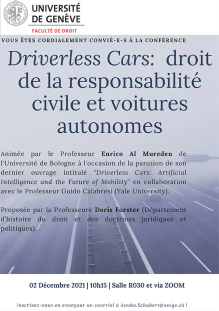 Automobiles are the technological innovation that has most influenced the 20th century’s social, economic, and legal structure. More than 100 years after the introduction of the auto, in an era again displaying extensive technological change, vehicular traffic is set to undergo major, radical, abrupt transformations. This book describes the scenarios and prospects stemming from the emergence of highly automated, connected driving. The key contribution of artificial intelligence will usher in an unprecedented mobility paradigm combining efficiency, safety, and environmental sustainability. Current and forthcoming problems, challenges, and at times tragic choices associated with the imminent “mobility revolution” are analyzed in the light of the Law and Economics method, of which the author Guido Calabresi (Yale University) is one of the founding fathers and (for over the past 50 years) a visionary scholar, and in the perspective of a dialogue between law and technology conducted by Enrico Al Mureden (University of Bologna) - professor of Civil Law and Product Safety, Product Liability and Automotive - through a systematic reading of the traditional categories of civil law and the harmonized technical standardization that dominates the automotive sector globally.
Automobiles are the technological innovation that has most influenced the 20th century’s social, economic, and legal structure. More than 100 years after the introduction of the auto, in an era again displaying extensive technological change, vehicular traffic is set to undergo major, radical, abrupt transformations. This book describes the scenarios and prospects stemming from the emergence of highly automated, connected driving. The key contribution of artificial intelligence will usher in an unprecedented mobility paradigm combining efficiency, safety, and environmental sustainability. Current and forthcoming problems, challenges, and at times tragic choices associated with the imminent “mobility revolution” are analyzed in the light of the Law and Economics method, of which the author Guido Calabresi (Yale University) is one of the founding fathers and (for over the past 50 years) a visionary scholar, and in the perspective of a dialogue between law and technology conducted by Enrico Al Mureden (University of Bologna) - professor of Civil Law and Product Safety, Product Liability and Automotive - through a systematic reading of the traditional categories of civil law and the harmonized technical standardization that dominates the automotive sector globally.
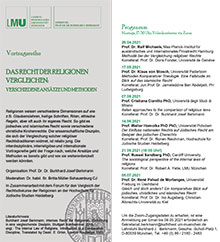
DAS RECHT DER RELIGIONEN VERGLEICHEN: VERSCHIEDENE ANSÄTZE UND METHODEN
vom 26.04.-05.07.2021 statt
Legal aspects of autonomous driving cars
The advancement of technology that makes it possible to entrust tasks traditionally performed by the driver to automated systems increasingly connected with road infrastructures requires a reconsideration of the rules governing road traffic and civil liability in the event of accidents.
The main legal issues generated by the spread of highly automated vehicles and the solutions that are emerging in the context of the European Union and the US will be reconstructed on the basis of an interdisciplinary approach.
On en parle dans le Journal de l'UNIGE:
https://www.unige.ch/lejournal/analyse/archives/voitures-autonomes



